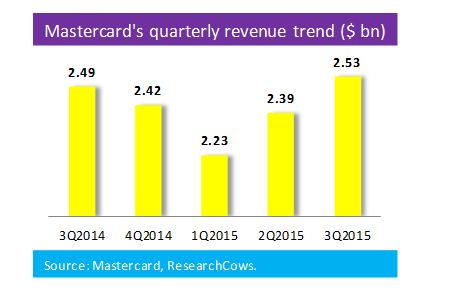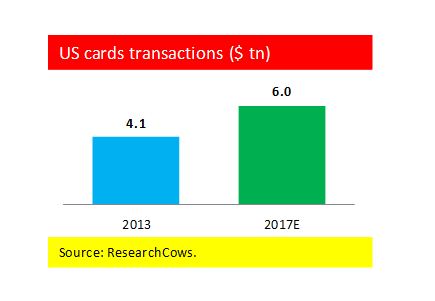On January 29, 2016, Mastercard Inc (NYSE:N:MA) will tell investors how it faired in the December quarter. In its last report (3Q2015) the company posted mixed results in which adjusted EPS of $0.91 both rose from the previous year’s same quarter and beat the consensus estimate. But revenue of $2.53 billion missed the consensus estimate of $2.55 billion despite rising 1.6% from a year ago.

Mastercard’s 3Q profitability was largely supported by strong card spending, especially in the U.S. and Asia markets. It will be interesting to see what the company reports for 4Q. However, investors want to know what opportunities or challenges lie ahead for Mastercard in 2016 and how the company is prepared to deal with them.
The rise of mobile and online payment systems have been cited as potential headwinds for Mastercard and Visa Inc. (NYSE:N:V) because they threaten to temper with their revenues in paperless payments market. Beyond digital disruption, there are legal and regulatory issues that could make or break Mastercard. Nevertheless, amid all the challenges, Mastercard is showing a great degree of resilience. What can you expect from Mastercard in 2016?
Near-term/long-term strengths
Disrupting the disruptor
Mastercard Inc (NYSE:MA) is fully aware that people are finding alternatives to its card payments service online and on mobile. The shift to mobile/online payments is also fueled by the penetration of e-commerce. Not to be left behind, Mastercard has and continues to ink strategic deals to ensure that it both defends its core cards business and takes advantage of the disruptive technologies.
For example, the company recently announced that it was getting together with Coin to bring payment capability in wearables such as smartwatches, fitness trackers and even jewelry. It is estimated that wearable payments market could be worth $53 billion by 2019.
Wearables are only a part of Mastercard’s non-traditional payments offerings. The company has a program it calls “Commerce for Every Device.” Under the program, Mastercard is working to support payments in virtually any connected device. Perhaps as part of that program, the company also recently launched an app that allows owners of modern Samsung (KS:005930) refrigerators to order and pay for groceries from the touchscreen of the fridge.
From the above developments and what the management has promised, Mastercard Inc (NYSE:MA) can be seen taking advantage of the technology initially appeared to threaten its existence.
Legacy payments business remains healthy
As much as digital payments services are helping people to sidestep traditional payment cards, the presently low global payments card penetration is a tailwind for Mastercard’s core business. Payment card systems are also poised to benefit from the secular shift from check and cash payments as more people move to take advantage of the security and convenience of carrying a card.
In the U.S., card-based transactions are expected to grow at 10% CAGR to reach an estimated $6.0 trillion by 2017, up from $4.1 trillion in 2013.

The market potential for Mastercard Inc (NYSE:MA) and its peers is also huge abroad, especially in regions like Asia-Pacific and Africa where millions of people still don’t have bank accounts. If it does its calculations well, Mastercard should grow at a double-digit rate in the international market compared to anticipated single-digit growth domestically.
Mastercard generates 40% of its revenues from the U.S. and the rest from international markets.
Cross-border transactions
Mastercard Inc (NYSE:MA) benefits immensely from a healthy international travel market. Transactions by cardholders when they travel abroad generate higher profit margins for Mastercard because of cross-border transactions chargers. About 20 to 30% of Mastercard’s total gross revenue comes through international travel.
A business tough to copy
Mastercard Inc (NYSE:MA) may face pressure in new market vectors such as digital, but its core cards business has high barriers to entry for newcomers. Not only has the company built a strong business network spanning more than 38 million merchants with over 1 billion branded cards in circulation, Mastercard is also a highly recognized global brand. With the growing cybersecurity threats, merchants and consumers are more comfortable working with reputable brands in their payments, which bodes well for Mastercard even as it expands into digital platforms.
Pressure zones
As much as Mastercard has multiple opportunities to exploit for continued growth, there are exist challenges for the company to navigate on its way to prosperity. But some of these challenges actually threaten the company’s existence.
Rival payments systems
Mastercard Inc (NYSE:MA) is facing growing competition from mobile and online payment providers such as PayPal Holdings Inc (O:PYPL). These competitors are giving Mastercard a rough run for paperless payment system dollars. E-commerce is among the factors fueling the adoption of alternatives to card payments.
Slowdown in international travel
Mastercard draws a significant portion of its revenues and profits from backing cards payments for transactions taking place outside the country in which a card was issued. In a healthy international travel industry, Mastercard not only benefit from higher revenues but also gets to tap premium profit margins. As such, slowdown in international travel can greatly temper with the growth of the company’s topline and bottom-line metrics.
Controversy over Interchange fees
Interchange fees, which describes the fee paid between banks for card support, has been a controversial issue. Regulators in different parts of the world have in the recent years increased their scrutiny of interchange rates. If pressure builds on Mastercard that it is no longer able to set interchange rates, it can result in banks losing interest in issuing new cards. If banks become less willing to issue new cards, it can hurt Mastercard’s growth, perhaps also slowing card penetration in the underserved markets.
Litigation pressures
Mastercard Inc (NYSE:MA) as well as its rival Visa have quite a number of unresolved lawsuits in different geographies. In the U.S. for instance, fantasy sports players have brought up class-action lawsuits against Mastercard and Visa. They claim that the card networks made them believe that fantasy sports was legal by accepting their payments to providers. The players are demanding that the card networks refund their money alongside other fees they were charged for the transactions.
The large number of pending lawsuits and the uncertainty of their outcomes pose serious risksfor Mastercard, because they can end up in costly settlements that can significantly hit the company’s bottom-line.
Shareholder orientation
Mastercard Inc (NYSE:MA) remains committed to returning value to shareholders even as it goes through a transition period that requires constant investments to keep up with the challenges. The company recently announced a fresh $4 billion buyback program that will be effective when the existing $3.75 billion repurchase program expires. About $786 million was remaining from Mastercard’s current buyback authorization, which means that the company now has about $4.8 billion to return to shareholders over the coming quarters.
Bottom line
Mastercard Inc (NYSE:MA) has a healthy balance sheet that reflected $3.9 billion of cash at the end of the last quarter. With such a flexible balance sheet, Mastercard should be in a position to defend and expand its market share as well as to continue to diversify its revenue streams.
Disclaimer: The opinions and data expressed herein by the author are not an investment recommendation and are not meant to be relied upon in investment decisions. The author is not acting in an investment advisory capacity, nor is this an investment research report. The author’s opinions expressed herein address only select aspects of potential investment in securities of the company or companies mentioned and cannot be a substitute for comprehensive investment analysis. Any analysis presented herein is illustrative in nature, limited in scope, based on an incomplete set of information, and has limitations to its accuracy. The author recommends that potential and existing investors conduct thorough investment research of their own, including detailed review of the companies’ SEC filings, and consult a qualified investment advisor. The information upon which this material is based was obtained from sources believed to be reliable, but has not been independently verified. Therefore, the author cannot guarantee its accuracy. Any opinions or estimates constitute the author’s best judgment as of the date of publication, and are subject to change without notice.
